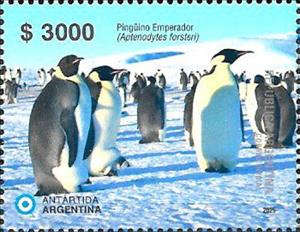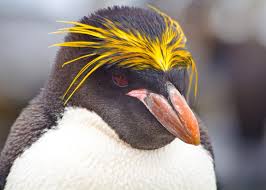Stamp: Emperor Penguin (Aptenodytes forsteri) (Argentina 2025)
Emperor Penguin (Aptenodytes forsteri) (Argentina 2025)
27 February (Argentina ) within release Argentina in Antarctica, 120 Years (2025) goes into circulation Stamp Emperor Penguin (Aptenodytes forsteri) face value 3,000 Argentine peso
| Stamp Emperor Penguin (Aptenodytes forsteri) in catalogues | |
|---|---|
| Colnect codes: | Col: AR 2025.02.27-01c |
Stamp is square format.
stamp from souvenir sheetAlso in the issue Argentina in Antarctica, 120 Years (2025):
- Souvenir Sheet - Argentina in Antarctica, 120 Years face value 4*3000;
- Stamp - Emperor Penguin (Aptenodytes forsteri) face value 3,000;
- Stamp - Marambio Research Base face value 3,000;
- Stamp - Sea King Helicopter face value 3,000;
- Stamp - Supply Ship Admiral Irizar face value 3,000;
Stamp Emperor Penguin (Aptenodytes forsteri) it reflects the thematic directions:
Animals are multicellular, eukaryotic organisms of the kingdom Animalia (also called Metazoa). All animals are motile, meaning they can move spontaneously and independently, at some point in their lives. Their body plan eventually becomes fixed as they develop, although some undergo a process of metamorphosis later on in their lives. All animals are heterotrophs: they must ingest other organisms or their products for sustenance.
Birds (Aves), a subgroup of Reptiles, are the last living examples of Dinosaurs. They are a group of endothermic vertebrates, characterised by feathers, toothless beaked jaws, the laying of hard-shelled eggs, a high metabolic rate, a four-chambered heart, and a strong yet lightweight skeleton. Birds live worldwide and range in size from the 5 cm (2 in) bee hummingbird to the 2.75 m (9 ft) ostrich. They rank as the class of tetrapods with the most living species, at approximately ten thousand, with more than half of these being passerines, sometimes known as perching birds. Birds are the closest living relatives of crocodilians.
Penguins are a group of aquatic flightless birds from the family Spheniscidae (/sfɪˈnɪsɪdiː, -daɪ/) of the order Sphenisciformes (/sfɪˈnɪsəfɔːrmiːz/). They live almost exclusively in the Southern Hemisphere: only one species, the Galápagos penguin, is found north of the Equator. Highly adapted for life in the ocean water, penguins have countershaded dark and white plumage and flippers for swimming. Most penguins feed on krill, fish, squid and other forms of sea life which they catch with their bills and swallow whole while swimming. A penguin has a spiny tongue and powerful jaws to grip slippery prey
Science is a systematic discipline that builds and organises knowledge in the form of testable hypotheses and predictions about the universe.Modern science is typically divided into two or three major branches: the natural sciences (e.g., physics, chemistry, and biology), which study the physical world; and the behavioural sciences (e.g., economics, psychology, and sociology), which study individuals and societies.The formal sciences (e.g., logic, mathematics, and theoretical computer science), which study formal systems governed by axioms and rules, are sometimes described as being sciences as well; however, they are often regarded as a separate field because they rely on deductive reasoning instead of the scientific method or empirical evidence as their main methodology. Applied sciences are disciplines that use scientific knowledge for practical purposes, such as engineering and medicine




